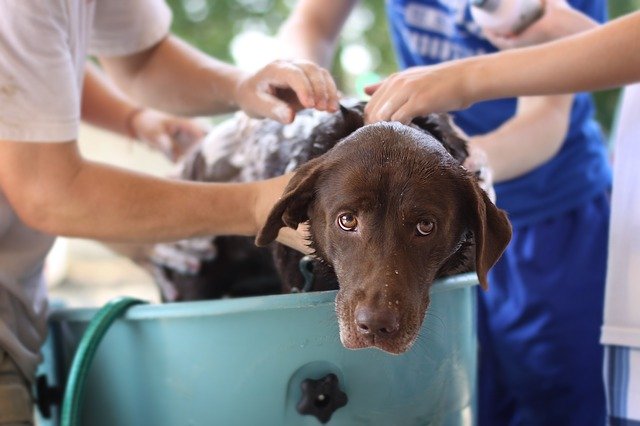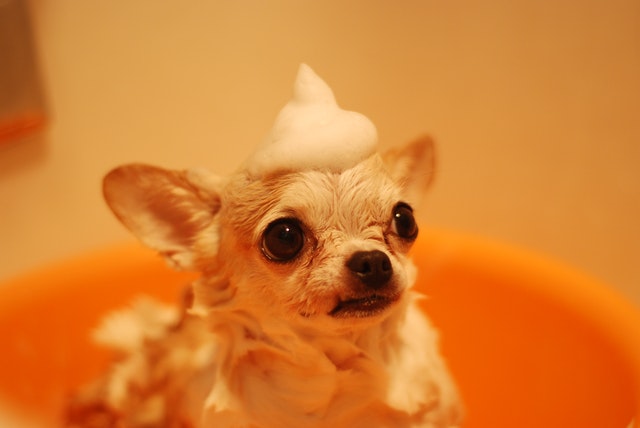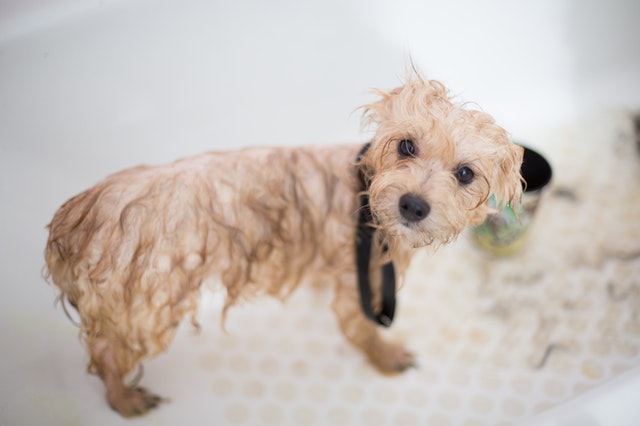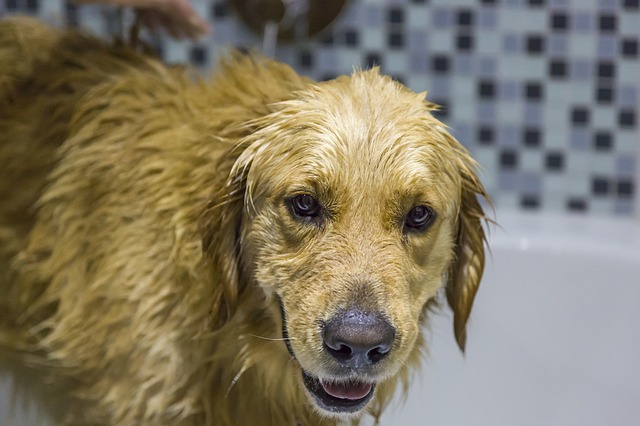Dogs get smelly, its a fact, and it often leads dog parents to wonder how often should I bathe my dog?
We as humans bathe or shower every day (and sometimes more in my job) and we wonder about hygiene for our pets. As part of good care, dogs can and should be trained to be calm and accepting of a bath at an early age. Because of the nature of a dog (see Why Does My Dog Stink), dog parents are left considering how much is too much or not enough when it comes to bathing the dog.
So, how often should you bathe your dog?
It is culturally expected that most human beings shower or bathe every day. We can even bathe more often as circumstances present themselves. We all know that gross feeling we get when we know we need a shower and we may get kind of paranoid that we smell bad.
Your dog has no such concern. She does not care how bad she smells and probably even rolls in bad odors just for the fun of it. WE care how our dogs smell and we also know that hygiene is important to overall health. Some people need truly frequent cleaning because of conditions like oily skin or acne and individual dogs’ needs can vary too.
Generally, dogs benefit from a once a week bath.

Most dogs need once a week bathing.
Factors to Keep in Mind For Bathing Frequency
With weekly baths, many dogs keep acceptably clean and their hair remains soft and not too brittle, but factors that can affect how often your dog needs to be bathed can include:
Oiliness of hair and skin
Oily skin (called seborrhea) is a medical condition and the treatment may include medicated baths. Your vet will tell you the frequency and even give you certain shampoos that are more effective. The amount of time the shampoo is in contact with your dog’s skin is also important. So if your dog feels greasy, ask your vet if he could have seborrhea. If your dog has a dry, flaky hair coat, bathing frequency might need to be less.

Topical Products
Full shampoo baths are recommended no more than once weekly if you use many of the topical flea products. Because some of them depend on oils in the skin to spread, shampoo can strip the oils away and change the efficacy. The manufacturers have certain shampoos that are preferred for this type of product because they are non-stripping. If you have a question about certain shampoos, ask the staff at the veterinary clinic where you purchase your flea products.
If you use an oral parasite control product, it is not imperative that you limit bathing. Sometimes my dog needs a bath every few days for odor control, it seems, so I use an oral option for fleas and ticks.
We go to assisted living facilities and other pet therapy locations so she must be clean and smell fresh. I always use a veterinary shampoo when I have her bathed and follow up with a conditioner for her hair coat.
Tolerance and Training
Dogs have to be taught about bathing. It’s a learning issue like any other. Some dogs love baths instantly, but all dogs must become accustomed to being wet and shampooed. Be patient when teaching a puppy to accept baths and do not force her if she is afraid. You can start feeding her or offering treats in the bathtub to make it feel like a good place. Also, make sure the water starts out slow dripping, rather than a full stream. Be certain the water is an acceptable temperature to your hand before wetting your pup.

Bath Time Inspection
Not only is clean hair and skin important for health, but bath time also provides the perfect moment to assess your dog’s overall condition. With his hair wet, his skin is more visible for your inspection. This provides a great chance to do a thorough look over. Search for any changes in their coat or skin health, noting differences in hair texture, missing hair, or the presence of parasites or skin masses.
Any bumps or scabs, tumors, or missing hair you might uncover in these inspections should be mentioned to the veterinarian as soon as possible.

Report any skin or coat changes to vet.
Weekly dog baths provide pooch parents with a great chance to check your dog and help him smell better. Plus, a pup’s bath time can help you remember to wipe out her ears and eyes and check her teeth. If your dog has been trained to think that baths are a routine part of his life, he won’t resist this valuable part of his care.
And remember, even if your pooch spends most of his time indoors, he will still benefit from weekly bathing. As will your furniture and the dog beds. Besides, is there anything better than cuddling a clean dog?
 Toledo, United States.
Toledo, United States.